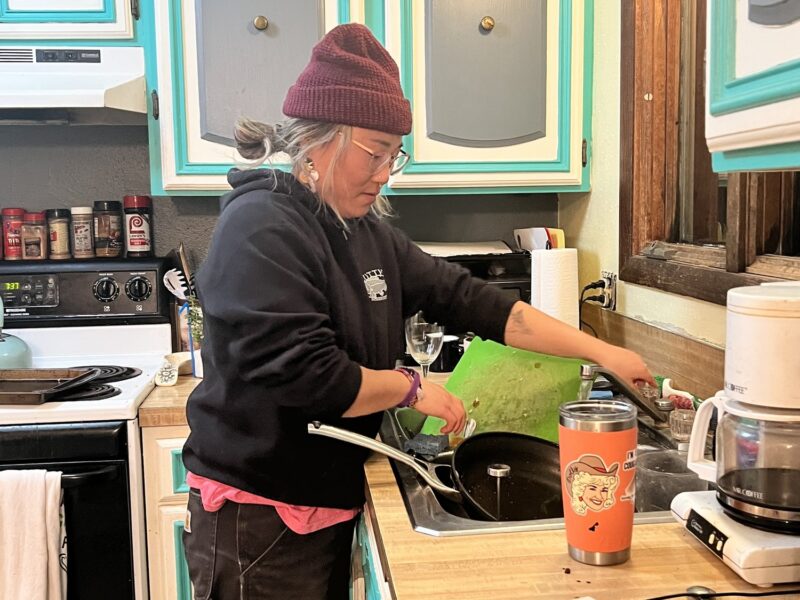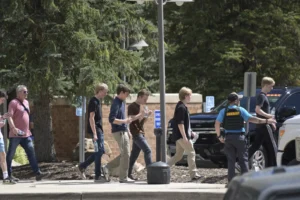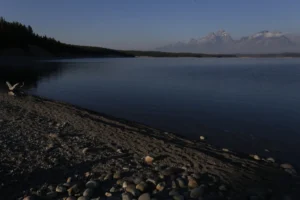Making It Work: Affordable Living in an Unaffordable Town
What it takes to live in and enjoy Jackson
- Published In: Other News & Features
- Last Updated: Mar 11, 2022

Anna Kerr, 27, is washing dishes in the house that she shares with her two roommates. Anna has lived in five houses during the past four years while living in Jackson, Wyoming. (Courtesy photo)
By Madeline Thulin
Special to the Wyoming Truth
With dreams of a bucolic future, Anna Kerr moved to Jackson from her home state of Washington in November of 2017. Four and a half years later, she has already lived in five places in and around Jackson—an inconvenient if necessary fact of the high cost of housing here. She has always lived with roommates, and she toils over 40 hours a week juggling two jobs.
Anna’s story is not uncommon. Jackson’s central location next to two soaring national parks and three ski resorts attract tourists and transplants hoping to call Jackson home. “[M]ost of us have moved here from other places to come and enjoy this place,” says Anna, who loves skiing and biking.
This beautiful oasis of natural splendor comes at a costly economic price. Housing—whether renting or buying–is rare and expensive. A two-bedroom, unfurnished apartment in Teton County costs about $2,472—more than triple the statewide average of only $790 in the latter part of 2020, according to the Wyoming Department of Administration and Information.

The Jackson & Teton County Annual Housing Supply, a government action plan approved by the Teton County Board of County Commissioners and the Jackson Town Council, says in its annual report, “For over three decades housing in Teton County has been unaffordable for the working class. That trend shows no signs of changing with housing prices at near all-time highs and incomes, while higher, not rising fast enough to keep pace.”
Underscoring the problem, ShelterJH, a Jackson nonprofit dedicated to helping people find housing, says in its policy platform, “Our housing market is not serving the vast majority of the people who make this community function, particularly our essential workers.… For decades we have been working to address this housing challenge, and yet the housing crisis continues to worsen, impacting the health and resiliency of our community.” Mary Erickson, co-founder and board chair of ShelterJH, could not be reached for comment.
For Anna, the housing crisis has cost her friendships, saying, “throughout the years I am seeing more and more friends move away with housing being sold or rent increasing. They have decided that the grind isn’t worth the struggle anymore.”
Anna dealt with this difficulty firsthand when she moved to Jackson. “I took whatever I could get [and] moved straight there without ever having seen the place,” she said. The result was not what she was looking for as she said she ended up in “a somewhat cheap room in the basement” in a “loud, messy and unideal house.”
As a result, Anna moved to a house in East Jackson before she moved into a place with her new boyfriend. From there, she moved to Victor, Idaho, a less expensive community twenty-five miles away from Jackson. When her relationship ended, she couch-surfed with a couple of friends for over a month and rented a storage unit to hold her possessions.
She thought she found a place to call home with friends in East Jackson until her landlord forced them to leave because he said there were too many people in the house; Anna and her roommates had also been a month late on the rent because they all lost their jobs as the pandemic raged. This home was condemned and demolished in the summer of 2021 to allow dense housing units to be built on the property. Anna was on the hunt again for housing.
Anna’s fifth home, on No Name Street in East Jackson, appears to be what she calls a “stable” situation, but she added, “Anytime I say that out loud, I feel like I am going to jinx myself.” She has lived here for over a year–it’s been her longest stint in one place in Jackson. Anna lives with two roommates in a single-family home, featuring two baths, a cozy kitchen and a spacious living room. Anna pays $850 in rent, and while “nothing is ideal—you either pay too much or [live with] people you don’t want to live with,” she says, “it’s a home, its cozy, it fits your things, and it’s good.”
Anna works two service industry seasonal jobs in the summer and two tourism industry seasonal jobs in the winter. Between all of her jobs, she earns about $27,000 a year–without benefits. She pays for her own health insurance. Anna makes trade-offs to afford Jackson, for instance, taking the Express Bus to work, using her free employee pass, which saves her $3 each way. The commute takes about thirty minutes. She uses her car as little as possible to save on gas and eats in often. Lately, she’s been inviting friends over for dinner and these dinners are reciprocated; they invite her over to dinner, too. When she does vacation, she tends to go to places where she can drive rather than fly, such as Sun Valley to camp and bike.
Despite the challenges of living in Jackson, Anna tries to help others who need housing. “Seeing my friends struggle and everything being taken away has motivated me to be a more active member in the community,” Anna says, who is a member with a variety of local organizations, including Shelter JH; the START bus, Jackson’s public bus service where she is a board member; JH Climate Action Collective, an organization seeking to reduce Jackson’s net carbon emissions to zero; and Sunrise JH, a youth-led initiative focused on environmental stewardship.
For all that she does, Anna remains worried that “Jackson is not going to be my forever home. I am barely scraping by as it is.”













